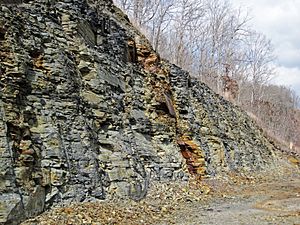Chattanooga Shale facts for kids
Quick facts for kids Chattanooga ShaleStratigraphic range: Devonian |
|
|---|---|

Chattanooga Shale in Kentucky
|
|
| Type | Formation |
| Underlies | Maury Shale, Boone Formation |
| Overlies | Unconformity on Ordovician Cumberland Formation Leipers Limestone and other units |
| Lithology | |
| Primary | Shale |
| Other | Sandstone |
| Location | |
| Region | Arkansas, Kentucky, Tennessee, Alabama, Georgia, Missouri, Mississippi |
| Country | United States |
| Type section | |
| Named by | Charles Willard Hayes |
The Chattanooga Shale is a special type of rock layer found deep underground. It's a geologic formation, which means it's a distinct set of rocks that geologists can identify and map. You can find this formation in several states across the southeastern United States, including Alabama, Arkansas, Kentucky, Missouri, and Tennessee.
This rock layer formed during the Devonian Period, a very long time ago. Scientists know this because the Chattanooga Shale contains tiny fossils of ancient sea creatures called conodonts. These fossils help us understand what life was like millions of years ago. The formation is mostly made of shale, a type of rock that forms from mud and clay.
Contents
Discovering the Chattanooga Shale
The Chattanooga Shale was named by Charles Willard Hayes, a geologist who studied rocks in the late 1800s. He named it after the city of Chattanooga, Tennessee, where this rock layer is quite common. It's found deep below the surface in many areas, like eastern Tennessee, southeastern Kentucky, northeastern Georgia, and northern Alabama.
What is Shale?
Shale is a fine-grained sedimentary rock. It forms when tiny particles of mud and clay settle in layers, often at the bottom of ancient seas or lakes. Over millions of years, these layers get pressed and hardened into rock. Shale often splits easily into thin sheets, which is a key feature of this rock type.
Natural Gas and the Chattanooga Shale
Scientists have found that the Chattanooga Shale contains significant amounts of natural gas. Natural gas is a fossil fuel, like coal and oil, that formed from the remains of ancient plants and animals. It's a very important energy source used to heat homes and generate electricity.
How Natural Gas is Found
To get natural gas from deep underground, companies use a method called hydraulic fracturing, often called "fracking." This process involves drilling a deep well into the rock formation. Then, a special liquid is pumped into the well at high pressure. This pressure creates tiny cracks in the shale, allowing the trapped natural gas to flow out and be collected. This method helps us access energy resources that are otherwise difficult to reach.
Connecting to Other Formations
The Chattanooga Shale in eastern Tennessee is thought to be connected to or similar to another important rock layer called the Marcellus Shale. The Marcellus Shale is found in the Appalachian region further to the east. Geologists study these connections to understand how ancient environments and rock layers spread across large areas.
Images for kids
 | Kyle Baker |
 | Joseph Yoakum |
 | Laura Wheeler Waring |
 | Henry Ossawa Tanner |




